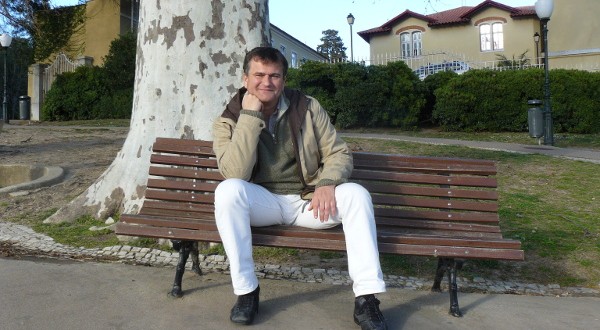ECO123: Are you working in Braga at present?
Roberto Merrill: Yes, I came back to Portugal as a post-doctoral researcher funded by the FCT (Foundation of Science and Technology). I did research in political philosophy and two weeks ago I went to live in Braga, because I managed to arrange a miracle there: a post as a lecturer, so I’m feeling very fulfilled.
How did you get involved with the unconditional basic income movement?
 My doctoral thesis in political philosophy was about the neutrality of the state. The topic of what it is that makes the authority of the state legitimate. How can the state’s laws be legitimate? There’s a very old debate, probably since John Locke, since Locke´s treatise on toleration, a theory above all of the liberals. Which says that to be just the state has to be morally neutral. It has to do with the fact that the state should not impose a good lifestyle on people. Leave people free to live as they wish. Provided there are the minimum levels of resources. And so in this debate I came across Philippe van Parijs, the Belgian philosopher who wrote the famous book “Real freedom for all’”. It is the most in-depth justification of the unconditional basic income. One of the most important justifications he gives is that the basic income is a neutral policy. And I found this very attractive because my research was very theoretical. And it was a way of carrying out my research that was a bit more applied; it is always good for a philosopher to look at the world.
My doctoral thesis in political philosophy was about the neutrality of the state. The topic of what it is that makes the authority of the state legitimate. How can the state’s laws be legitimate? There’s a very old debate, probably since John Locke, since Locke´s treatise on toleration, a theory above all of the liberals. Which says that to be just the state has to be morally neutral. It has to do with the fact that the state should not impose a good lifestyle on people. Leave people free to live as they wish. Provided there are the minimum levels of resources. And so in this debate I came across Philippe van Parijs, the Belgian philosopher who wrote the famous book “Real freedom for all’”. It is the most in-depth justification of the unconditional basic income. One of the most important justifications he gives is that the basic income is a neutral policy. And I found this very attractive because my research was very theoretical. And it was a way of carrying out my research that was a bit more applied; it is always good for a philosopher to look at the world.
This idea also went into the constitution of the UN.
The Universal Declaration of Human Rights. Yes, like almost all declarations.
Do you have any idea why the Portuguese government has not yet implemented this concept for freeing its citizens from the fear of existence?
The people in government are not very liberal, that is they cannot prevent themselves from forming moral judgements about how people should live. They create conditions under which it is difficult to live. Is it right to give money to people who do not work for it? I think that this is a big ideological brake, but morally, for anyone who reflects seriously on this, it is easily refuted. It is not a rational debate. And then there is the fear of financing, above all else. I think that most people, even if they think about it a bit, cannot imagine how it would be possible to finance it. I’m hoping to do a master’s in economics in Minho this year, in particular on this topic, how to finance it. And in that way I can learn the basics of economics, so the reasons are first of all of a moral nature, and then of a technical nature.
What does being liberal mean to you?
The word liberal comes from the liberal trend in politics. It was a great advance in civilisation, the fact of having people, especially the Englishman John Locke, who tried to defend in the best possible way the right of people to organise their lives as they wish and to protect this right. It also implies not stigmatising people, but redistributing wealth so that people can truly exercise their freedom. That is another tradition that is part of liberalism.
The UBI needs to be financed. Do you have any idea about how this could be done? If we only paid each person 500 euros, that’s 48 billion per year straight away.
There is no doubt at all that it can be financed, without burdening the state budget, without increasing the hole in the state budget. We would only have to increase taxes, but so slightly that it would hardly be noticeable. Instead of being able to buy three yachts per year, some would just buy two. Of course, that will not seriously increase the capitalist, consumerist way of life, of those people who need huge amounts of luxury goods in order to live. That’s what the simulation looks like. It seems to make complete sense. And the idea is to give an income of 420 euros to each Portuguese adult and 20% to each child.
Thank you very much.
 Eco123 Revista da Economia e Ecologia
Eco123 Revista da Economia e Ecologia


